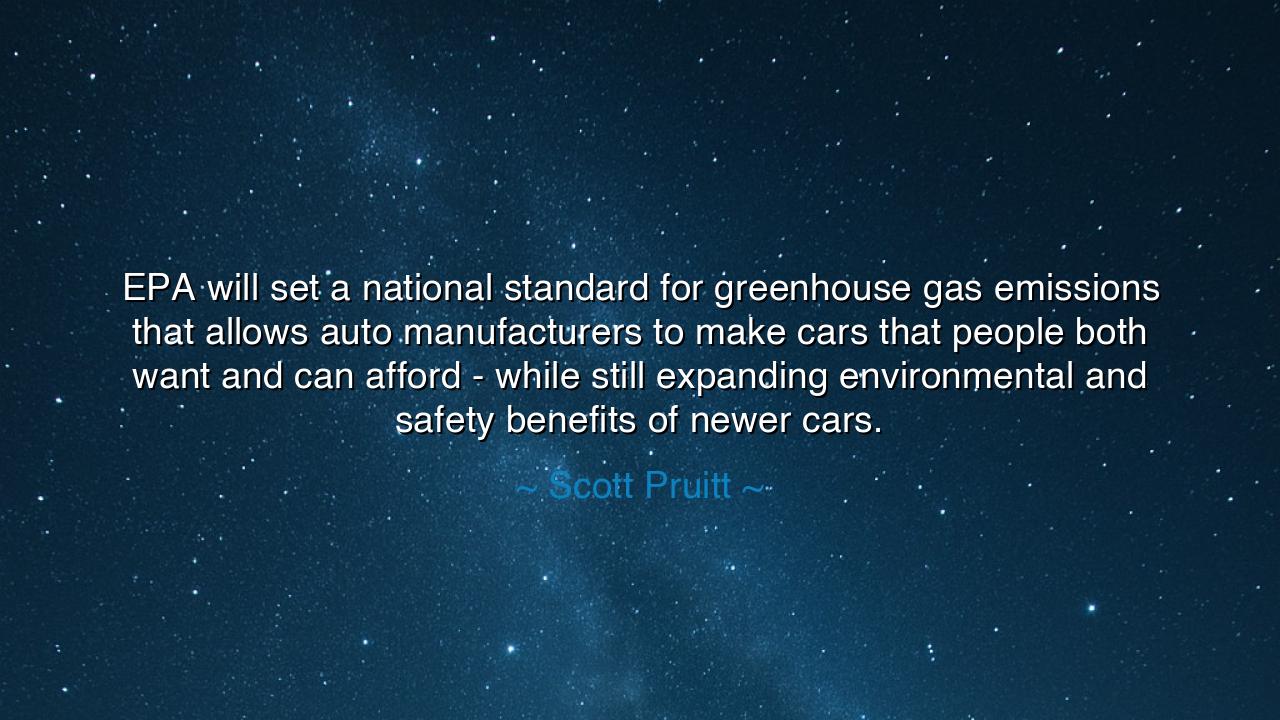
EPA will set a national standard for greenhouse gas emissions
EPA will set a national standard for greenhouse gas emissions that allows auto manufacturers to make cars that people both want and can afford - while still expanding environmental and safety benefits of newer cars.






The words of Scott Pruitt, spoken as steward of the nation’s environmental agency, reveal the enduring struggle of balance: “EPA will set a national standard for greenhouse gas emissions that allows auto manufacturers to make cars that people both want and can afford—while still expanding environmental and safety benefits of newer cars.” In this declaration, he speaks to the tension between prosperity and preservation, between the desires of the people and the duty to guard the earth. His promise is that progress must not come at the cost of human need, nor should human need be indulged at the expense of the planet.
At the heart of his words lies the call for standards. For without standards, the race of commerce runs without restraint, and the world is left in ruin. Yet, standards that are too severe risk alienating the people, who long for freedom in choice, affordability, and mobility. Pruitt names the EPA as the instrument of balance, seeking a path where manufacturers may thrive, citizens may drive, and the environment may still be shielded from unchecked harm. This is not a cry for extremes, but for a middle way where innovation serves both desire and duty.
History offers us mirrors of this struggle. When the Clean Air Act of the 1970s was passed, automakers feared ruin, claiming that stricter emissions laws would bankrupt their industry. Yet, compelled to innovate, they produced cleaner engines, and the air of America grew clearer while the auto industry survived. So too in Pruitt’s words we hear the echo of that ancient cycle: resistance to change, fear of cost, yet the necessity of balance—to push manufacturers toward responsibility without crushing them under impossible burdens.
His words also call forth the eternal truth that desire must be tempered by wisdom. People want cars that are fast, stylish, and affordable. Yet unchecked desire leads to excess—vehicles that consume too much fuel, emit too many gases, and leave the earth poorer for their indulgence. By invoking affordability alongside safety and environmental benefits, Pruitt recognizes that true prosperity is not found in reckless consumption but in harmonizing human wants with planetary needs.
There is also a deeper moral current: the recognition that leadership must guide both industry and citizenry toward the common good. Left to themselves, companies may seek only profit; citizens may seek only comfort. It is the task of standards, of law, to shape these pursuits into a path that does not betray the generations to come. To allow people only what they want is to invite destruction; to demand only what the earth needs is to risk rebellion. The art of governance lies in weaving the two together into a vision that sustains life and freedom alike.
The lesson is clear: innovation must serve responsibility. Automakers must see not only customers but also children yet unborn, who will inherit the skies they pollute or preserve. Citizens must see not only the price of a car but the cost of ignoring the climate. Leaders must wield law not as a chain, but as a compass, pointing the way toward harmony. When each does their part, prosperity and preservation are no longer enemies, but allies.
Therefore, children of tomorrow, remember this wisdom: seek not only what is cheap, nor only what is pleasing to the eye, but what sustains the circle of life. Support standards that call forth the creativity of industry while guarding the earth’s breath. Demand cars, technologies, and policies that honor both desire and duty. For the true measure of progress is not how fast we can drive, but how wisely we walk the road—leaving behind a world not diminished, but renewed for those who follow.






AAdministratorAdministrator
Welcome, honored guests. Please leave a comment, we will respond soon